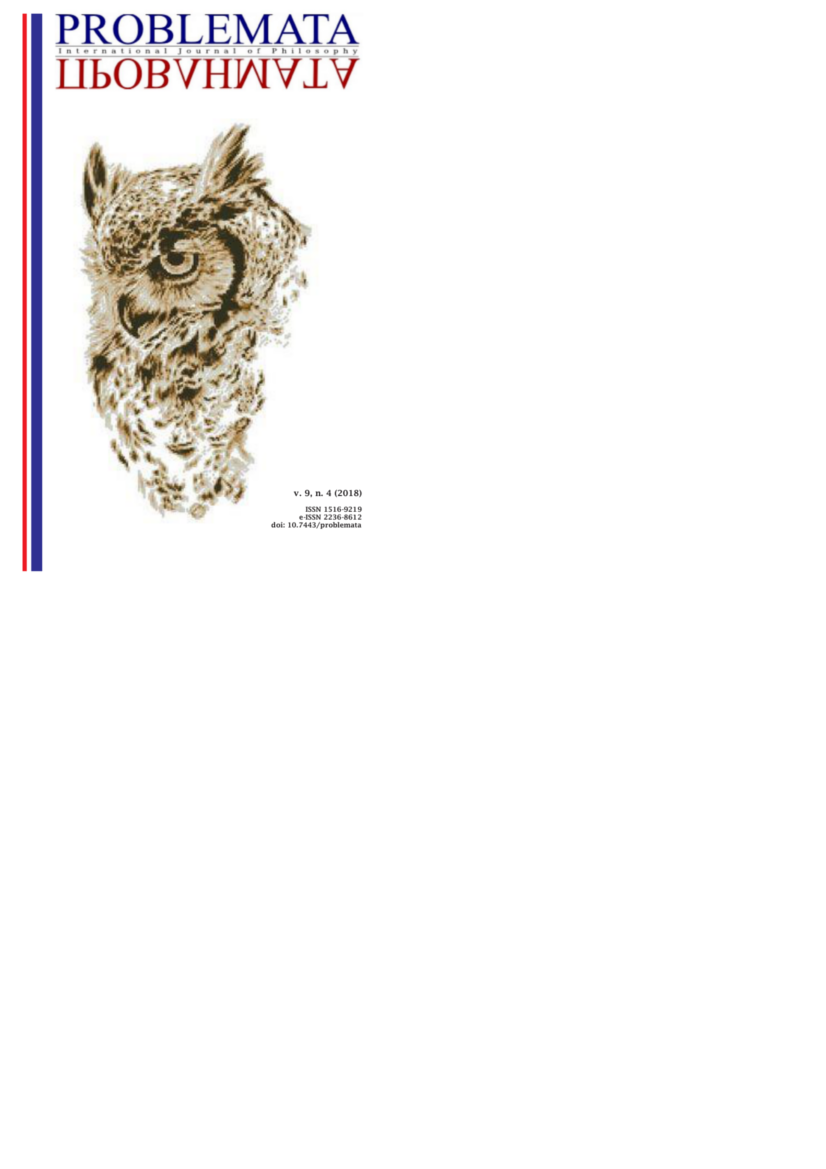HOBBES, PITKIN E A REPRESENTAÇÃO POLÍTICA
DOI:
https://doi.org/10.7443/problemata.v9i4.40661Palavras-chave:
ações, representação, identidade, contrato, atores, convenção.Resumo
O presente artigo pretende examinar a tensão argumentativa presente no capítulo XVI do Leviathan, especialmente no que diz respeito ao cenário teatral político composto por determinados elementos teóricos, tais como a pessoal natural e artificial, atribuições de ações e palavras, de um lado, autorização e autoridade política, de outro lado. Evidencia-se que a correta contextualização desses elementos teóricos torna-se imprescindível para se determinar os pressupostos da construção de uma identidade entre a vontade e as ações do ator e do autor no âmbito da constituição da pessoa civil pública. Essa identidade demonstra, por sua vez, que a teoria da representação política desenvolvida no Leviathan, sustenta-se a partir de uma identificação correlacional entre aquele que autoriza uma ação e, respectivamente, aquele que é autorizado a agir em nome de outro.
Downloads
Referências
COPP, David. Hobbes on artificial persons and collective actions. The Philosophical Review, 89 (4), pp. 579-606, 1980.
DUMOUCHEL, Paul. Persona: Reason and Representation in Hobbes's Political Philosophy. SubStance, 25 (2), pp. 68-80, 1996.
JAUME, Lucien. Hobbes et l’État représentatif moderne, Paris: Presses Universitaires de France, 1986.
______. Le Vocabulaire de la Représentation Politique, in: ZARKA Y. C. (org.). Hobbes et son vocabulaire, Paris: Vrin, 1992.
DERRIDA, Jacques, Sending: On Representation, Social Research, 49.2 (1982), pp. 294-326 (p. 298).
GILL, Christopher. Personhood and Personality: The four-Personae Theory in Cicero, De Officiis”. Oxford Studies in Ancient Philosophy, Vol. 6. Oxford: Oxford University Press, pp. 169-199, 1988.
HOBBES, Thomas. Leviathan, or The Matter, Forme and Power of a Commonwealth Ecclesiasticall and Civil. Ed. C. B. Macpherson. Harmondsworth: Penguin Books, 1968.
______. Elementorum philosophiae sectio secunda De homine. London, 1658.
______. Leviathan, sive De materia, forma, & potestate civitatis ecclesiasticae et civilis. London,1668.
______.Elementos da Lei Natural e Política. Trad. Bruno Simões e Rev. Aníbal Mari. São Paulo: WMF Martins Fontes, 2010.
______.Do cidadão. Elementos Filosóficos a Respeito do cidadão. Tradução de Renato Janine Ribeiro. São Paulo: Martins Fontes, 2002
HAMPTON, Jean. The Intrinsic Worth of Persons: Contractarianism in Moral and Political Philosophy. Cambridge: Cambridge University Press, 2007.
HILL, Christopher. Covenant Theology and the Concept of ‘A Public Person’”. In: Power, Possessions, and Freedom: Essays in Honour of C.B. Macpherson. Ed. Alkis Kontos. Toronto: University of Toronto Press, pp. 3-22, 1979.
KROM, M., The Limits of Reason in Hobbes's Commonwealth, New York: Continuum Press, 2011.
MORTON, Adam. Why there is no Concept of a Person. In: The Person and the Human Mind: Issues in Ancient and Modern Philosophy. Ed. Christopher Gill. Oxford: Oxford University Press, pp. 39-60, 2001.
OSTRENSKY, Eunice. Soberania e representação: Hobbes, Parlamentaristas e Levellers. Lua Nova, São Paulo, 80: 151-179, 2010
PITKIN, Hanna. The Concept of Representation. Londres: University of California Press, 1967.
POLIN, Raymond. Politique et philosophie politique chez Hobbes, Paris: P.U.F., 1953.
RUNCIMAN, David. Pluralism and the Personality of the State. Cambridge: Cambridge University Press, 1997.
______. What Kind of Person is Hobbes's State? A Reply to Skinner. The Journal of Political Philosophy, 8 (2), pp. 268-278, 2000.
______. Hobbes’s theory of representation: anti-democratic or proto-democratic? In: Political Representation. Ed. Ian Shapiro, et al. Cambridge: Cambridge University Press, pp. 15-34, 2009.
RORTY OKSENBERG, Amélie. 2001. “Persons and Personae”. In: The Person and the Human Mind : Issues in Ancient and Modern Philosophy. Ed. Christopher Gill. Oxford: Oxford University Press, pp. 21-38.
SKINNER, Quentin. Hobbes and the Purely Artificial Person of the State”, in: Visions of Politics: Hobbes and the Civil Science, Cambridge: Cambridge University Press, 1999.
______. Hobbes on Representation, European Journal of Philosophy, 13 (2): 155–184, 2005.
______. Hobbes on Persons, Authors and Representatives. In: The Cambridge Companion to Hobbes’s Leviathan. Ed. Patricia Springborg. Cambridge: Cambridge University Press, pp. 157-180, 2007.
TUKIAINEN, Arto. The Commonwealth as a Person in Hobbes's Leviathan. Hobbes Studies, 7 (1), pp. 44-55, 1994.
THORBURN, W. M. “What is a Person?”. Mind, 26 (103), pp. 291-316, 1917.
TRICAUD, François. 1982. “An Investigation Concerning the Usage of the Words‘Person’ and ‘Persona’ in the Political Treatises of Hobbes”. In: Thomas Hobbes: His View of Man. Ed. J. G. van der Bend. Amsterdam: Rodopi, pp. 89-98.
ZARKA, Yves Charles. Hobbes et la pensée politique moderne. Quadrige/PUF: Paris, 2001.
______. (org.). Hobbes et son vocabulaire, Paris: Vrin, 1992.
WALDMAN, Theodore. “Hobbes on the Generation of a Public Person”. In: Thomas Hobbes in His Time. Ed. Ralph Ross et al. Minneapolis: University of Minnesota Press, pp. 61-83, 1974.
Downloads
Arquivos adicionais
Publicado
Edição
Seção
Licença
Autores que publicam nesta revista concordam com os seguintes termos:
- Autores mantém os direitos autorais e concedem à revista o direito de primeira publicação, com o trabalho simultaneamente licenciado sob a Licença Creative Commons Attribution que permite o compartilhamento do trabalho com reconhecimento da autoria e publicação inicial nesta revista.
- Autores têm autorização para assumir contratos adicionais separadamente, para distribuição não-exclusiva da versão do trabalho publicada nesta revista (ex.: publicar em repositório institucional ou como capítulo de livro), com reconhecimento de autoria e publicação inicial nesta revista.
- Autores têm permissão e são estimulados a publicar e distribuir seu trabalho online (ex.: em repositórios institucionais ou na sua página pessoal) a qualquer ponto antes ou durante o processo editorial, já que isso pode gerar alterações produtivas, bem como aumentar o impacto e a citação do trabalho publicado (Veja O Efeito do Acesso Livre).








